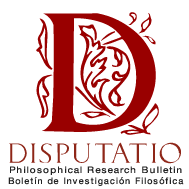Tomasz Zarębski
University of Lower Silesia, Wrocław, Poland | tomasz.zarebski@dsw.edu.pl
Received: 16-March-2019 | Accepted: 17-April-2019 | Published: 30-June-2019
Disputatio [Jun. 2019], Vol. 8, No. 9, pp. 00-00 | DOI: 10.5281/zenodo.3242090
Article | [EN] | Full Text | Statistics | Copyright Notice [es] | Vol. 8 No. 9
How to cite this article:
Zarębski, Tomasz. (2019). «Does Language Have an Essence? From Wittgenstein via Rhees to Brandom». Disputatio. Philosophical Research Bulletin 8, no. 9: pp. 00-00.
Abstract | Ludwig Wittgenstein is widely known to have held the view that language has no essence (Wittgenstein 2009, § 65), i.e. that no particular language game is more constitutive of our ability to speak than others. One of the first critical discussions opposing the stance that Wittgenstein had taken, was delivered by Rush Rhees in his “Wittgenstein’s Builders” (Rhees 1959; Rhees 2006). Rhees warns us against letting the metaphor of language as a game go too far, and thus “seduce” us —which supposedly happened to Wittgenstein. Instead, he argues that apart from different particular functions that language may serve, it has to have something that secures the unity of discourse and that can be called its essence. He sees this crucial element in “discourse” or “conversation”. In his justification of such a view, Rhees advances some hints, though not developed into a thorough elaboration, which may be read in an inferentialist spirit. Displaying such features as semantic holism, propositionalism, essentialism and —as the present paper suggests —a rudimentary version of inferentialism, Rhees’ deliberations tally with Brandom’s philosophical project. Thus, the paper is intended to analyse these features as a background for Brandom’s wider conception.
Keywords | Philosophy of Language · Inferentialism · Wittgenstein’s Builders.
![]()
¿El lenguaje tiene una esencia? De Wittgenstein vía Rhees a Brandom
Resumen | Es bien sabido que Ludwig Wittgenstein tenía el punto de vista de que el lenguaje no tiene esencia (Wittgenstein 2009, § 65), es decir, que ningún juego de lenguaje en particular es más constitutivo de nuestra capacidad de hablar que otros. Una de las primeras discusiones críticas oponiendo la postura que Wittgenstein había adoptado fue suministrada por Rush Rhees en su ensayo “Wittgenstein’s Builders” (Rhees 1959; Rhees 2006). Rhees nos advierte contra dejar que la metáfora del juego de lenguaje llegue demasiado lejos y que de esta manera nos “seduzca” —cosa que supuestamente sucedió a Wittgenstein. El arguye que, además de las diferentes funciones particulares que el lenguaje puede tener, también tiene que tener algo que asegura la unidad del discurso, y esto se puede llamar su esencia. Él ve este elemento crucial en el “discurso” o en la “conversación”. Al justificar dicho punto de vista, Rhees avanza algunos atisbos —aunque no desarrollados a elaboración detallada— que se pueden interpretar con un espíritu inferencialista. Exhibiendo características como un holismo semántico, proposicionalismo, esencialismo y —según sugiere este trabajo— una versión rudimentaria de inferencialismo, hay coincidencia entre las reflexiones de Rhees y el proyecto filosófico de Brandom. El objetivo del presente trabajo es analizar estas características como trasfondo para la concepción más amplia de Brandom.
Palabras Clave | Filosofía de lenguaje · Inferencialismo · Los constructores de Wittgenstein.
References
Baker, Gordon P. and Peter M. S. Hacker (2005). Wittgenstein: Understanding and Meaning. Part II: Exegesis §§ 1–184. Oxford: Blackwell Publishing.
Brandom, Robert B. (1994). Making It Explicit. Cambridge, MA.: Harvard University Press.
Brandom, Robert B. (2000). Articulating Reasons. Cambridge, MA.: Harvard University Press.
Cavell, Stanley (1962). “The Availability of Wittgenstein’s Later Philosophy.” The Philosophical Review, vol. 71, no. 1: pp. 67–93. doi: https://doi.org/10.2307/2183682
Goldfarb, W. D. (1983). “I Want You to Bring Me a Slab: Remarks on the Opening Sections of the Philosophical Investigations.” Synthese, vol. 56, no. 3: pp. 265–282. doi: https://doi.org/10.1007/BF00485466
Johanessen, Harald (2008). “While Reading Wittgenstein PI §§ 1–19 (I): A Cautionary Tale.” In Interpreting Wittgenstein: Four Essays, 63–80. Bergen: The Wittgenstein Archives at the University of Bergen. http://wittgensteinrepository.org/agora–wab/article/view/2934/3588.
Phillips, Dewi Z. (2006). “Introduction to R. Rhees’ Wittgenstein and the Possibility of Discourse.” In Wittgenstein and the Possibility of Discourse, edited by Dewi Zephaniah Phillips, pp. xxv–xliv. Oxford: Blackwell Publishing.
Pichler, Alois (2007). “The Interpretation of the Philosophical Investigations: Style, Therapy, Nachlass.” In Wittgenstein and His Interpreters: Essays in Memory of Gordon Baker, edited by Guy Kahane, Edward Kanterian, and Oskari Kuusela, pp. 123–144. Ames, Iowa: Blackwell Publishing. doi:10.1002/9780470690963.ch4.
Rhees, Rush (1959). “Wittgenstein’s Builders.” Proceedings of the Aristotelian Society vol. 60, num. 1, pp. 171–186. doi: https://doi.org/10.1093/aristotelian/60.1.171
Rhees, Rush (2006). Wittgenstein and the Possibility of Discourse. Edited by Devi Zephaniah Philips. Malden, MA.: Blackwell Publishing.
Wittgenstein, Ludwig (1922). Tractatus Logico–Philosophicus. London: Paul Kegan, Trench, Trubner & Co., Ltd.
Wittgenstein, Ludwig (2009). Philosophical Investigations [PI], ed. Gertrude Elizabeth Margareth Anscombe, Peter Michael Stephen Hacker, and Joachim Schulte. Oxford: Wiley–Blackwell.
© The author(s) 2019. This work, published by Disputatio [www.disputatio.eu], is an Open Access article distributed under the terms of the Creative Commons License [BY–NC–ND]. The copy, distribution and public communication of this work will be according to the copyright notice. For inquiries and permissions, please email: boletin@disputatio.eu.
